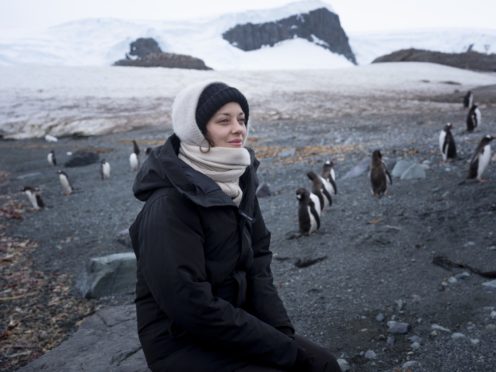Oscar-winning actress Marion Cotillard has journeyed to the Antarctic as part of a Greenpeace expedition to highlight the “alarming rate” at which the continent is changing.
The French actress, best known for starring as Edith Piaf in 2007’s La Vie En Rose, was joined by marine biologists as well as Vikings star Gustaf Skarsgard and Chinese actress Ni Ni.
The group, who have all signed up as Greenpeace ocean ambassadors, hope to show how climate change, plastic pollution and industrial fishing are impacting penguin colonies, whales and other marine life.

Cotillard is leading the call for a global network of ocean sanctuaries.
She said: “The Antarctic is a frozen wilderness that should be far beyond the reach of human impact, but even the most remote parts of our planet are changing at an alarming rate.
“It’s the first time I’ve ever lived on a ship, and it’s amazing to spend time with the Greenpeace crew and the scientists who are out here doing crucial work to understand the threats facing the oceans, like climate change, industrial fishing and plastic pollution.
“Our planet is a blue planet: the ocean covers more of it than every continent combined. We all have a responsibility to protect it.”

Travelling on the Greenpeace ships Esperanza and the Arctic Sunrise, the four-week expedition will see six scientists from Stony Brook University and Northeastern University in the US conduct research to see how human activities are transforming the area.
They will travel to a number of islands around the Antarctic Peninsula to gather data on the health of penguin colonies.
Greenpeace oceans campaigner Louisa Casson said: “Oceans across the world are under increasing pressure and the Antarctic is no exception.

“The threats facing this remote wilderness give greater urgency to our call for a strong global ocean treaty and the creation of a global network of ocean sanctuaries that allow marine life to thrive.”
Associate professor of ecology and evolution at Stony Brook University Heather J Lynch, who is leading the scientific research, said: “We are going to gather data on the status of penguin colonies in places that have either never been properly surveyed or haven’t been surveyed since the 1970s, allowing us to observe the pace of change in this region over the past half-century.
“Penguins are sentinel species, by studying them we can understand how climate change and fisheries are affecting the Antarctic environment.”
The voyage is the last stop on Greenpeace’s Pole To Pole expedition from the Arctic to the Antarctic, to promote a new United Nations global ocean treaty.
